
A Dutch court has ordered Shell to strengthen its carbon emissions targets in a landmark ruling.
The Anglo-Dutch oil major currently has a target to reduce the carbon intensity of its products by at least 6% by 2023, 20% by 2030, 45% by 2035 and 100% by 2050 compared with 2016 levels.
But, following judge Larisa Alwin’s ruling at a courtroom in The Hague, Netherlands, Reuters reported that Shell will now have to cut its global CO2 emissions by 45% by the end of 2030 compared to 2019 levels to bring its plans in line with the goals of the Paris Agreement.
“The court orders Royal Dutch Shell, by means of its corporate policy, to reduce its CO2 emissions by 45% by 2030 with respect to the level of 2019 for the Shell group and the suppliers and customers of the group,” said Alwin.
Shell becomes first fossil fuel company ordered to reduce its carbon emissions in landmark court ruling
The court deemed that Shell’s current targets were insufficiently “concrete” and determined that the company has a duty of care to reduce its absolute carbon emissions.
The verdict marks the first time a major fossil fuel company has been held accountable for its contribution to climate change and ordered to reduce its carbon emissions throughout its whole supply chain.
According to the Guardian, the oil giant was claimed to have been in breach of order 6:162 of the Dutch civil code and violating articles 2 and 8 of the European convention on human rights – the right to life and the right to family life – by potentially causing a danger to others when alternative measures could be taken.
Shell, which has the right to appeal the verdict, argued there was no legal basis for the case and that governments alone are responsible for meeting the goals set out in the Paris agreement.
A spokesperson for Shell acknowledged that “urgent action” is needed on climate change and said this is why the company has accelerated its efforts to become a net-zero emissions energy firm by 2050, with short-term targets in place to track its progress.
“We are investing billions of dollars in low-carbon energy, including electric vehicle charging, hydrogen, renewables and biofuels,” they added.
“We want to grow demand for these products and scale up our new energy businesses even more quickly. We will continue to focus on these efforts and fully expect to appeal today’s disappointing court decision.”
Shell ruling shows multinational corporations can be held accountable for climate crisis, says Greenpeace
The lawsuit was brought forward in April 2019 by a number of environmental groups, including Friends of the Earth Netherlands, Greenpeace Netherlands and more than 17,000 individual co-plaintiffs.
“This verdict is a historic victory for the climate and everyone facing the consequences of the climate crisis,” said Andy Palmen, interim director of Greenpeace Netherlands. “Shell cannot continue to violate human rights and put profit over people and the planet.
“This verdict is a clear signal to the fossil fuel industry. Coal, oil and gas need to stay in the ground. People around the world are demanding climate justice.
“Today the court confirmed that the fossil fuel industry cannot continue their climate pollution. We can hold multinational corporations worldwide accountable for the climate crisis.”






